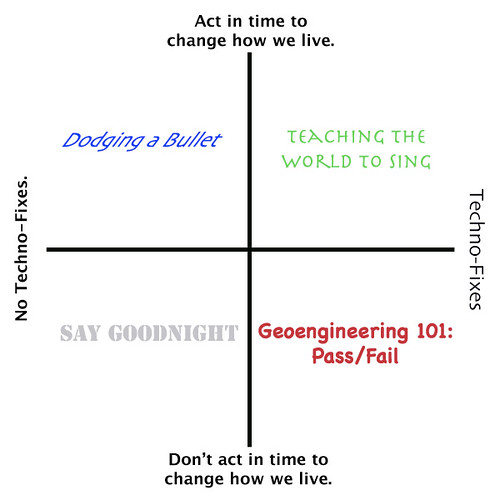Earth Day Voices: Jamais Cascio
Four Futures for the Earth
by Jamais Cascio
Never trust a futurist who only offers one vision of tomorrow.
We don't know what the future will hold, but we can try to tease out what it might. Scenarios, which combine a variety of important and uncertain drivers into a mix of different -- but plausible -- futures, offer a useful methodology for coming up with a diverse set of plausible tomorrows. Scenarios are not predictions, but examples, giving us a wind-tunnel to test out different strategies for managing large, complex problems.
And there really isn't a bigger or more complicated problem right now than the incipient climate disaster. Today, there seems to be two schools of thought regarding the best way to deal with global warming: the "act now" approach, demanding (in essence) that we change our behavior and the ways that our societies are structured, and do it as quickly as possible, or else we're boned; and the "techno-fix" approach, which says (in essence) don't worry, the nano/info/bio revolution that's just around the corner will save us. Generally, the Worldchanging approach is to emphasize the first, with a sprinkle of the second for flavor (and as backup).
The thing is, these are not mutually-exclusive propositions, and success or failure in one doesn't determine the chance of success or failure in the other. It's entirely possible that we will change our behavior/society/world (ahem), and also come up with fantastic new technologies; it's also possible that we'll stumble on both paths, neither fixing things in time nor getting our hands on the tools we could use to repair the worst damage.
To a futurist, a pair of distinct, largely independent variables just begs to be turned into a scenario matrix. So let's give in, and take a brief look a the four scenarios the combinations of these two paths create:

Dodging a Bullet
2037: It's amazing how fast we went from "is this real?" to "what can we do?" to "let's do it now." There was no silver bullet, no green leap forward, just a billion quiet decisions to act. People made better, smarter choices, and the headlong rush to disaster slowed; encouraged by this, we started to focus our investments and social energy into solving this problem, and eventually (but much faster than we'd dared hope!) the growth of atmospheric carbon stopped. There's still too much CO2 in the air, and we know we're going to be dealing with a warming climate for awhile still, but the human species actually managed to choose to avoid killing itself off.
This is a world in which civil society begins to focus on averting climate disaster as its primary, immediate task, even at the cost of some economic growth and general technological acceleration. Most governments and institutions curtail research and development without direct climate benefits, leading to a world of 2037 that's nowhere near as advanced as futurists and technology enthusiasts had expected. A succession of environmental disasters linked (in the public mind, at the very least) to global warming -- killing hundreds of thousands, and leaving tens of millions as refugees -- gave added impetus to a world-wide effort; by 2017, a clear majority of the world's population was willing to do anything necessary to avoid the environmental collapse that many scientists saw as nearly inevitable. One popular slogan for the climate campaign was "we could be the best, or we could be the last."
Teaching the World to Sing
02037: I stumbled across a memory archive from twenty years ago, before the emergence of the Chorus, and was shocked to see the Earth as it was. Oceans near death, climate system lurching towards collapse, overall energy flux just horribly out-of-balance. I can't believe the Earth actually survived that. I had assumed that the Chorus was responsible for repairing the planet, but no -- We told me that, even by 02017, the Earth's human populace was making the kind of substantive changes to how it lived necessary to avoid real disaster, and that 02017 was actually one of the first years of improvement! What the Chorus made possible was the planetary repair, although We says that this project still has many years left, in part because We had to fix some of We's own mistakes from the first few repair attempts. The Chorus actually seemed embarrassed when We told me that!
This is a world in which immediate efforts to make the social and behavioral changes necessary to avoid climate disaster make possible longer-term projects to apply powerful, transformative technologies (such as molecular manufacturing and cognitive augmentation) to the problem of stabilizing and, eventually, repairing the broken environment. It's not quite a Singularity, but is perhaps something nearly as strange: a world that has come to see few differences between human systems and natural/geophysical systems. "We are Gaia, too," the aging (but quite healthy) James Lovelock reminded us in 2023. And Gaia is us: billions of molecular-scale eco-sensors and intelligent simulations give the Earth itself an important voice in the global Chorus.
Geoengineering 101: Pass/Fail
2037: The Hephaestus 2 mission reported last week that it had managed to stabilize the wobble on the Mirror, but JustinNN.tv blurbed me a minute ago that New Tyndall Center is still showing temperature instabilities. According to Tyndall, that clinches it: we have another rogue at work. NATO ended the last one with extreme prejudice (as dramatized in last Summer's blockbuster, "Shutdown" -- I loved that Bruce Willis came out of retirement to play Gates), but this one's more subtle. My eyecrawl has some bluster from the SecGen now, saying that "this will not stand," blah blah blah. I just wish that these boy geniuses (and they're all guys, you ever notice that?) would put half as much time and effort into figuring out the Atlantic Seawall problem as they do these crazy-ass plans to fix the sky.
This is a world in which attempts to make the broad social and behavioral changes necessary to avoid climate disaster are generally too late and too limited, and the global environment starts to show early signs of collapse. The 2010s to early 2020s are characterized by millions of dead from extreme weather events, hundreds of millions of refugees, and a thousand or more coastal cities lost all over the globe. The continued trend of general technological acceleration gets diverted by 2020 into haphazard, massive projects to avert disaster. Few of these succeed -- serious climate problems hit too fast for the more responsible advocates of geoengineering to get beyond the "what if..." stage -- and the many that fail often do so in a spectacular (and legally actionable) fashion. Those that do work serve mainly to keep the Earth poised on the brink: bioengineered plants that consume enough extra CO2 and methane to keep the atmosphere stable; a very slow project to reduce the acidity of the oceans; and the Mirror, a thousands of miles in diameter solar shield at the Lagrange point between the Earth and the Sun, reducing incoming sunlight by 2% -- enough to start a gradual cooling trend.
Say Goodnight
2030-something. Late in the decade, I think. Living day-to-day makes it hard to keep track of the years. The new seasons don't help -- Stormy, Still Stormy, Hellaciously Stormy, and Blast Furnace -- and neither does the constant travel, north to the Nunavut Protectorate, if it's still around. I hear things are even worse in Europe, if you can believe that. I don't hear much about Asia anymore, but I suppose nobody does now. The Greenland icepack went sometime in the last few years, and I hear a rumor that Antarctica is starting to go now. Who knows? I still see occasional aircraft high overhead, but they mostly look like military planes, so don't get your hopes up: they're probably from somebody who thinks it's still worth it to fight over the remaining oil.
This is a world in which we don't adopt the changes we need, and technology-based fixes end up being too hard to implement in sufficient quantity and scale to make a real difference. Competition for the last bit of advantage (in economics, in security, in resources) accelerates the general collapse. Things fall apart; the center does not hold; mere anarchy is loosed upon the world.
Pick your future.
Jamais Cascio co-founded Worldchanging, and wrote over 1,900 articles for the site during his tenure. He now works as a foresight and futures specialist, serving as the Global Futures Strategist for the Center for Responsible Nanotechnology and a Research Affiliate for the Institute for the Future. His current online home is Open the Future.

 Attention, European university students (or their friends and families): how would you like to design an unmanned aerial vehicle for use on Mars?
Attention, European university students (or their friends and families): how would you like to design an unmanned aerial vehicle for use on Mars? Documentary filmmakers are in a particularly difficult position in terms of intellectual property, as most documentarians focus on lives of real people -- and modern life, especially in the US, Europe and Japan, is inundated with logos, music, background video and myriad other trademark and copyright concerns.
Documentary filmmakers are in a particularly difficult position in terms of intellectual property, as most documentarians focus on lives of real people -- and modern life, especially in the US, Europe and Japan, is inundated with logos, music, background video and myriad other trademark and copyright concerns.  Even in the best case climate scenarios, the planet is going to face years of rising temperatures and some pretty unpleasant (and often tragic) results across much of the world. Given that many of the worst-hit locations will be in the poorer nations, it's important that we spend some time thinking about ways not just to mitigate the process of climate disruption -- that is, to reverse it -- but also to mitigate its effects. This isn't "adaptation," it's harm reduction; think of it as suppressing the worst symptoms while fighting to cure the disease.
Even in the best case climate scenarios, the planet is going to face years of rising temperatures and some pretty unpleasant (and often tragic) results across much of the world. Given that many of the worst-hit locations will be in the poorer nations, it's important that we spend some time thinking about ways not just to mitigate the process of climate disruption -- that is, to reverse it -- but also to mitigate its effects. This isn't "adaptation," it's harm reduction; think of it as suppressing the worst symptoms while fighting to cure the disease.



